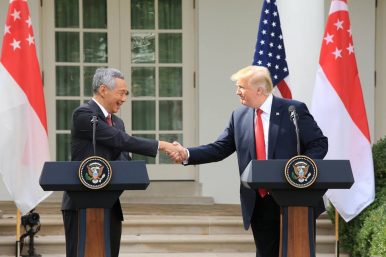By Prashanth Parameswaran
 A closer look at the significance of bilateral security cooperation in a new area for both countries.
A closer look at the significance of bilateral security cooperation in a new area for both countries.
Last week, the United States and Singapore held an engagement that represented the first step by both countries to officially operationalize a defense partnership in the area of artificial intelligence (AI). Beyond its individual significance, the engagement also highlighted ongoing efforts by the two countries to strengthen cooperation in new areas of the security aspect of their bilateral ties.
As I have noted before, the United States and Singapore have long viewed each other as vital strategic partners, and that extends to the security realm as well, with the United States being a key supplier of defense technology and facilities for military training for Singapore, and the city-state is a valuable regional partner across a range of issues from counterterrorism to maritime security, while also hosting a U.S. Navy logistics command unit that coordinates regional operations.
The defense relationship has continued to advance in recent years. Though the headlines are often focused on individual developments such as new exercises and defense sales, the United States and Singapore have also been looking at how to work in new security areas, as set out in the new enhanced defense cooperation agreement (Enhanced DCA) that both sides had inked in 2015 which covered areas such as humanitarian assistance and disaster relief, cybersecurity, and biosecurity.
Last week, one of the newer security aspects of the U.S.-Singapore relationship was in the headlines again with the forging of a new defense partnership between the two countries. The U.S. Department of Defense (DOD) Joint Artificial Intelligence Center (JAIC) and Singapore’s Defense Science and Technology Agency (DSTA) held an exchange to promote collaboration regarding the use of artificial intelligence (AI).
The multi-day technology exchange was held ahead of the second iteration of the Singapore Defense Technology Summit in Singapore, which was inaugurated in 2018. It came amid other interactions that also spotlighted the defense aspect of U.S.-Singapore defense collaboration, including meetings between Singapore’s Defense Minister Ng Eng Hen with Pentagon officials including the assistant secretary of the Air Force for acquisition, technology, and logistics; the director of the Defense Advanced Research Projects Agency; and the director of Defense Technology Security Administration.
Per a statement by the Pentagon released on June 27, the exchange was focused on fostering the use of AI capabilities to enhance defense operations in support of humanitarian assistance and disaster relief operations (HA/DR), especially given the fact that the Asia-Pacific remains prone to natural disasters.
While the engagement may have been on AI-enabled HA/DR, its significance ought to be viewed as being in line with the willingness of the United States and Singapore to foster greater collaboration in artificial intelligence in their strategic partnership. As the Pentagon statement noted, the collaboration represented “a first step” for the two organizations to share ideas and knowledge to push new, innovative, AI-enabled applications, and, in the vein, the two organizations discussed the use of AI in a range of other areas as well.
Unsurprisingly, those areas were not publicly disclosed by either side. But the very fact that this new collaboration is being forged and both countries are thinking about advancing it suggests that AI will continue to be one of many fronts on which U.S.-Singapore defense collaboration will continue to be forged in years to come.
No comments:
Post a Comment